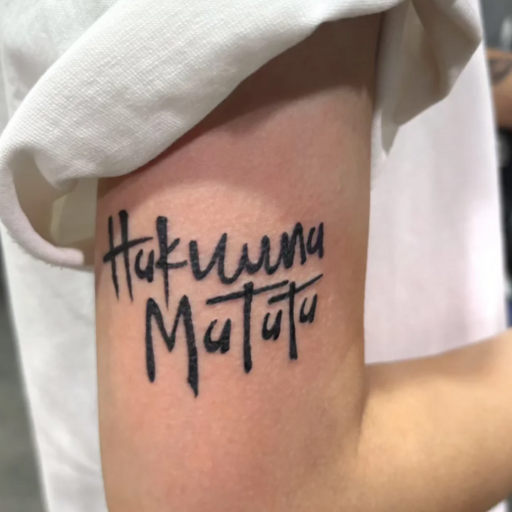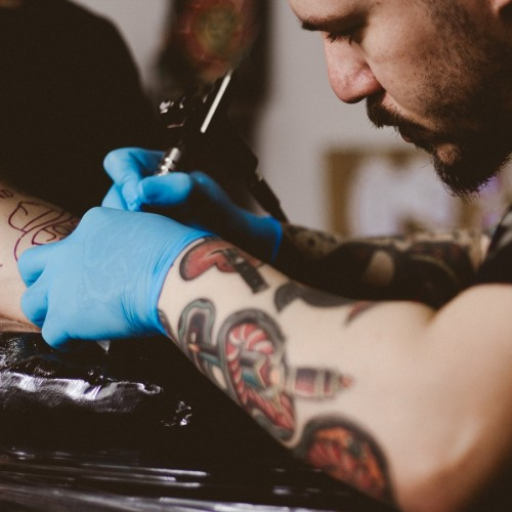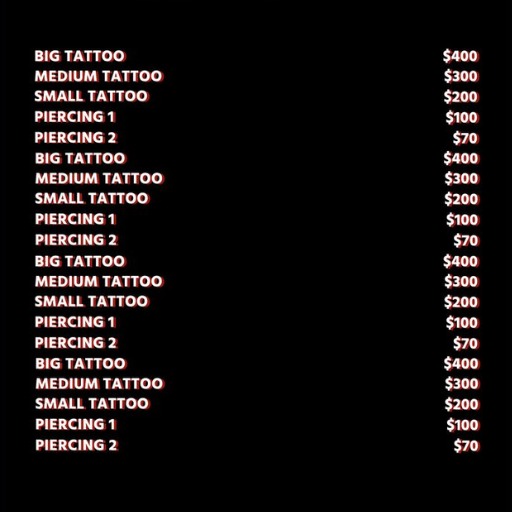Tattoos are perhaps one of the latest, worldwide, accepted forms of self-expression, with limitless designs, styles, and sizes. But a common concern to everyone is “How much does a tattoo cost?”, which will depend on several factors including size. In this in-depth blog post, we will cover everything you need to know from pricing based on sizes, the time tattoos will take, and additional factors that outline the final value. If you are starting your tattoo collection or plan on adding another piece, this overview is the best guide for you to understand tattoo pricing before heading to the artist.
What is the average cost of a tattoo?

The price range of a tattoo will depend on its size and level of detail, its location on the body, and the skill of the artist. Small tattoos usually cost between $50 and $200, medium-sized ones go for $200 to $500, while larger custom pieces start at $500 and can go up to several thousands of dollars. Price is also dependent on the tattoo artist, as some charge an hourly rate of $100-$300, subject to change based on the artist’s fame and skill level.
Understanding Factors That Affect the Price of Tattoos
The most important factors that affect the price of tattoos are the artist’s details, the work details, and the location of the body that is going to be tattooed. As for the work details, I believe that the complexity and the provided detail levels of the tattooed design play a huge role as simpler designs generally are more affordable than larger complex ones. Also, the tattoo’s placement on your body may affect the price based on how easy it is to do for the artist. In addition, the artist’s level of experience, reputation, and even the studio’s area also matter; famous experienced practitioners have expensive fees, and studios in larger cities are usually more expensive than those in smaller towns. In general, studios either have a fixed price or charge on an hourly basis the tattoo artist; hence it is best to communicate with the artist regarding the design as well as the costs before the appointment.
Average cost per hour for tattoo artists
On average, tattooists charge between $100-$250 per hour, which is highly dependent on the artist’s skill and location. Well known or highly sought after tattooists may charge over $300 per hour, while novice tattooists in small towns may charge closer to $75-$100 per hour. I recommend doing some digging and contacting the artist directly because the estimate will largely depend on the design and the number of sessions required.
Typical price ranges for different tattoo sizes
Depending on the intricacy and the location of the tattoo, small tattoos go for $50-$150. Medium tattoos go from $150-$450. Large tattoos usually begin at $500 and can mount over $4000 for massive intricate pieces. Personally, I suggest reaching out to your artist so you can discuss your design particulars as this will determine the final price. Remember this is an investment and your satisfaction will speak volumes to the quality received.
How do tattoo sizes influence the cost?

The cost range is greatly affected by the size of the tattoo. Smaller tattoos take less time, effort, and resources to complete, therefore costing less. Smaller tattoos tend to cost less since they utilize fewer resources, whereas large tattoos cost more due to their intricate detailing which often requires multiple sessions and a lot more ink to accomplish. The detail of a tattoo also impacts the cost as larger, more complex pieces need an advanced level of skill to accomplish.
Small tattoo prices
Small tattoos tend to cost anywhere from $50 to $200 depending on the artist’s reputation, studio location, and overall design complexity my personal experience and research. Most shops have a minimum fee that is charged in an attempt to cover basic needs, and this fee is usually about $50. For simple, small designs you could expect to pay closer to the $50 mark, but more intricate ones will cost more. For an accurate quote, it is best to approach your artist or studio directly so they can provide you with a quote tailored to your expectations.
Medium-sized tattoo costs
Due to the intricacy of their designs, medium-sized tattoos tend to take between two and five hours to complete. Such tattoos cost between $150 and $500 based on the artist’s skill, the location of the shop, as well as the color and complexity of the design. As an added note, deeper-colored tattoos may require specialized inks, thus increasing the cost. As with anything you’re budgeting for, be sure to plan and have a transparent discussion about the estimated time along with design particulars and any fees with your desired artist or studio ahead of time.
Large tattoo and full sleeve pricing
Prices often depend on the tattoo artist’s hourly wage, which is normally between $100 to $300 and sometimes even higher, as well as the difficulty, detail, and time required to complete the tattoo. As a result, large tattoos and full sleeves usually cost $1500 -$4000 or more. These tattoos can take multiple sessions to complete, sometimes between ten to thirty hours, meaning that from the beginning you should have a budget and time frame set. To receive an informed estimate, I’d suggest speaking to a professional artist directly to share your expectations.
What factors influence the cost of a tattoo?

A tattoo’s price is affected by many factors. A reputable artist will charge more, this is due to their experience and skill as they would have honed these traits throughout the years. The complexity of the artwork entails the intricacy of the design, the placement, vibrant colors, shading, and the duration it takes to complete the tattoo. Seasoned artists cost more, but you can rest assured the value difference is justified. As with everything in life, where you live will also determine the price you pay. Finally, the region and studio you choose will also vary in charges. Keep these considerations in mind when setting aside resources for a tattoo.
The skill level and experience of the artist
In my personal experience, tattoo artists come with a myriad of skills that impact the quality of work offered, along with its price. Gaps in regions result in hiked prices at demand periods as seasoned artists spend years honing their ability and creating one-of-a-kind signature styles. I always recommend checking an artist’s previous work to scan for reviews and validation marks so they can Kyoto to ensure the best result. Being an experienced artist means high precision, creativity, and long-term satisfaction, so the price paid is justifiable.
Tattoo design complexity
In my view, the intricacies of tattoo design lie in the intricate balance between detail and practicality. As complexity rises, an increasing number of elements are incorporated using fine lines and shading, which naturally requires a greater degree of time, skill, and expense. While simple designs are usually faster and easier to execute, they can be just as profoundly eloquent given the right circumstances and personal touch. Styling and consulting with an experienced tattoo artist who can match their skill set to your expectations alongside your budget is invaluable.
The impact of place and cost of living on prices
Geographical factors profoundly determine the pricing of studio locations as there are regional differences in the cost of living. In general, the charge for studios in metropolitan areas, as well as regions with greater cost of living, is higher because they need to rent, and pay utilities, and overall, the demand for tattoos is much higher in the area. On the other hand, tattoo studios in rural or less expensive areas tend to charge much lower rates. Moreover, the reputation of the studio and the scarcity of qualified specialists in a certain region determine the pricing greatly. You should do your homework and examine nearby tattoo studios while taking into account cost of living variations to achieve an optimal price-quality ratio.
How can I budget for my tattoo?

To budget for your tattoo, first consider how much you are willing to allocate based on the anticipated design’s size, complexity, and time needed. Look up nearby tattoo studios and their typical price ranges, including whether they charge by the hour or have a set rate. Save little by little, if necessary, and remember to budget for the tattoo artist’s tip—generally 15-20% of the total cost. Lastly, do not compromise quality for a less expensive option; by paying more for a good artist, you guarantee their safety and your satisfaction with the outcome.
Setting realistic expectations for tattoo costs
I prepared my budget based on certain guidelines provided to me by Trustworthy Websites. It is advised that such websites and articles should be completely relied on. To begin with, tattoo prices depend heavily on size, design, and the artist’s skill level. Average expenses for basic pieces are roughly $50 to $200, with fewer tattoo expenses that are more intricate as well as larger costs in the hundreds to thousands. Many artists have an hourly pay rate which can range from $100 to $250 per hour. Like many businesses, a good tattoo shop has to pay for the location and so does the quality of service provided. For that reason, purchasing from other lesser studios is not advised even though their pricing is competitively low. Lastly, keeping room in the budget for the tattoo artist is wise for proper respect. 15 to 20 percent is a rather fair price for proper respect.
Saving Tips for Your Desired Tattoo
A headstart is needed when it comes to saving for a tattoo. Start by establishing a budget that accommodates the size, detail, style, and complexity of the tattoo. Look into the artist’s hourly pay and the expected length of time similar tattoos take to complete. If the artist charges $150 an hour and your tattoo might take 4 hours, plan for $600 with a 15-20% tip on top of that. Your total would be around $690-$720.
If you intend on saving effectively, set aside a reasonable amount of your paycheck specifically for your tattoo. You can create a dedicated savings account or utilize budgeting applications to track your savings. Booking ensures availability and allows additional time to save, so be sure to book your appointment with your preferred artist early. Don’t forget to enjoy the process and the waiting time – the result will be worth it. Events are offering safer eco-friendly or discounted inks, but don’t sacrifice professional standards just to save a few dollars. Staying organized will allow you to get your dream tattoo without worrying financially.
Understanding additional costs: Touch-ups and aftercare
From my experience, planning a tattoo requires more than just the initial payment; prospective clients should add aftercare and touch-ups to their budgets as well. Depending on how well the tattoo heals, some artists may offer complimentary or reasonably priced touch-ups within a certain timeframe. Additionally, aftercare is equally as important in preserving the tattoo. Purchasing quality moisturizers, soaps, and ointments aids in ensuring the tattoo heals properly and can remain vibrant for a long time. By planning for these expenses, I can protect my investment and guarantee my tattoo will maintain its utmost desirable appearance for as long as possible.
What should I know about tattoo shop pricing?

Tattoo shops often use different pricing methodologies depending on a variety of factors. Most shops charge a flat rate for each piece or an hourly fee which usually starts at $100 and can increase as high as $300 or more, depending on skill and demand for the artist’s services. Premium prices are likely to be set by well-known or experienced achiever artists. Price variation can also result from the degree of detail, the size of the tattoo, or even color illustrations. Focusing solely on costs rather than the overall quality might yield unsatisfactory results, so it’s crucial to do prior research. Be sure to verify the typical charges and any other fees the shop may have to avoid shock expenses.
Explanation of the minimum charges and hourly rates
Concerning the minimum charges and hourly rates for tattoos, I explain what I consider to be the most important aspects based on my research. Most tattoo shops set a minimum charge, which I believe ranges from $50 to $100. The minimum charge usually covers preliminary costs such as sterilization, equipment, and the artist’s time even with the most simple designs. However, hourly rates depend from artist to artist, as well as from one studio to another. In my estimations, those usually vary from $100 to $250 during one hour of work, but some collectors of high art may charge higher. It’s an excellent tactic to speak with the artist about their budget and design details before diving deeper into costs.
Consultation fees and deposits
Most tattoo studios will want to conduct a consultation before the appointment‚ especially for complex or custom styles. During this session, the artist goes over the design concepts, including how and where the tattoo will be placed and any other specifications that you may have. Consultation costs generally fall between $20 and $50 but may be counted toward the cost of the tattoo if you decide to get it. Many studios also expect a client to pay a deposit to guarantee an appointment. This deposit usually ranges from $50 to $100, depending on the intricacy and size of the tattoo. In most cases, the deposit is non-refundable, but it will be deducted from the total price of the tattoo. Make sure that you communicate these particulars with the studio to avoid any misunderstandings.
Tattoo Artists and Tipping
When it comes to appreciating the skill and effort that a tattoo artist puts in, tipping is one of the important ways to show gratitude. Typically, it is expected that you will tip anywhere between fifteen to twenty percent of the total fee of the tattoo, though if it’s especially remarkable or if the experience was particularly nice, you are welcome to tip more than that. If the tattoo involves multiple sessions, it is advisable to tip after each session. Cash is usually preferred, but some studios do accept payment app tips. Keep in mind that tips help the artist the most directly because part of the tattoo fee goes to the studio. Always bear in mind your budget when tipping; however, giving a small tip shows a sign of appreciation and is always a good thing.
References
Frequently Asked Questions (FAQ)
Q: What is the average tattoo cost?
A: The average tattoo cost can vary widely depending on several factors. Generally, prices range from $50 to $300 per hour, with the average tattoo costing between $200 to $500. However, larger or more complex tattoos may cost significantly more, potentially reaching thousands of dollars.
Q: How much do tattoos cost based on size?
A: The size of the tattoo is a major factor that influences the cost. Tiny tattoos may cost as little as $50-$100, while small tattoos (2-4 inches) typically range from $100-$300. Medium-sized tattoos (4-6 inches) can cost $300-$700, and large tattoos (6+ inches) or full sleeves may cost $500 to several thousand dollars.
Q: What factors influence tattoo prices?
A: Several factors influence the cost of a tattoo, including the size, complexity of the design, location on the body, colors used, the artist’s experience and reputation, the tattoo studio’s location, and the time it takes to complete the tattoo. Custom designs and highly detailed work will typically cost more than simple, pre-made designs.
Q: Do tattoo artists charge by the hour or by the piece?
A: Many tattoo artists charge by the hour, especially for larger or more complex pieces. Hourly rates typically range from $100 to $300 per hour, depending on the artist’s experience and location. However, some artists may charge a flat rate for smaller, simpler tattoos or offer package deals for larger projects.
Q: How can I budget for my tattoo?
A: When budgeting for your tattoo, consider the following tips: research average tattoo prices in your area, get quotes from multiple artists, factor in additional costs like touch-ups and aftercare products, and set aside extra money for tipping your tattoo artist (15-20% is customary). It’s also wise to budget for potential future touch-ups or additions to your tattoo.
Q: Are there additional costs associated with getting a tattoo?
A: Yes, there are often additional costs to consider when getting a tattoo. These may include a deposit to secure your appointment, aftercare products, touch-up sessions, and tipping your tattoo artist. Some studios may also charge a separate fee for custom designs or consultations.
Q: How much does a full-sleeve tattoo cost?
A: Full sleeve tattoos are among the most expensive due to their size and the time involved. On average, a full sleeve tattoo can cost anywhere from $2,000 to $7,000 or more, depending on the complexity of the design, the artist’s skill level, and the number of sessions required to complete the tattoo.
Q: Can I negotiate the price of a tattoo?
A: While some artists may be open to negotiation, it’s generally not recommended to haggle over tattoo prices. Professional tattoo artists price their work based on their skill, experience, and the time and materials required. Instead of trying to negotiate a lower price, consider adjusting your design or choosing a less experienced artist if the cost is beyond your budget.







